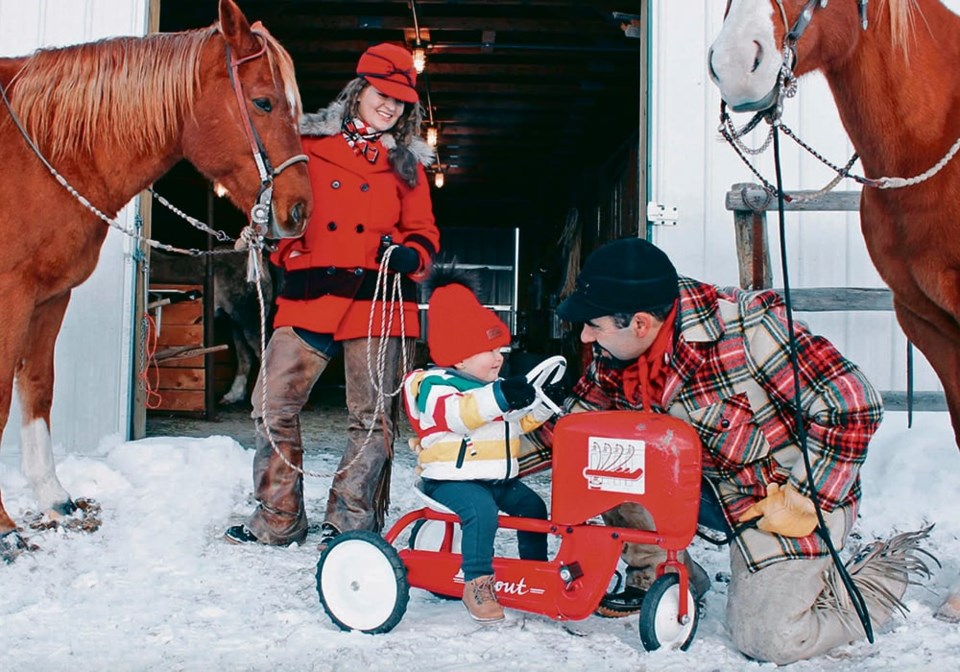WESTERN PRODUCER. — Keeping kids safe on the farm is a key consideration during the winter, whether it’s snow-submerged fence posts, hidden barbed wire on snowmobile trails, snow removal that reduces yard visibility or the exhaustion that comes with winter calving,. 

Snow sports, shifting weather, extreme cold and chores can add to safety risks.

Trish Henderson and her family, including husband Tim, son Luke, 11, and daughter Wynne, 6, ranch just outside Erskine, Alta. For everyone at LLB Angus, winter is the busiest time of the year. 

“Winter is long,” says Henderson with a laugh. “We’re calving.”

With 1,000 head to care for, the ranch has employees working with all kinds of equipment on different properties. The yards are busy and Wynne and Luke have clear guidelines about where, when and with whom they can visit the various areas of the ranch. 

Bennett Ray is 11 years old, loves to play hockey and spends a lot of time with his sister, Ellie 10, playing outside with a crowd of cousins. 

He is part of a large family that often gathers at one of several neighbouring properties that are part of the Kinch family ranch near Water Valley, Alta. Like his mother, Chelsea, Bennet grew up on this land and learned the most important rule early.

“Be aware of where you are,” he says. 

Cait Bascom and her husband, Lee, manage approximately 96 sections of community pasture near Robsart, Sask. Their daughter, Ruby, is 18 months old and is often part of the activity. Having grown up in a ranching family in Alberta, Bascom is aware of farm safety risks.

Many families have stories of personal or community experience with childhood injury and death while working or playing on the farm. 

The Alberta government advises guardians and parents to consider attention span, balance, speed and reaction time, co-ordination, peripheral vision, risk management and critical thinking skills before assigning chores. 

The website also notes that bulky winter layers can limit children’s vision, hearing, speed and range of motion.

Henderson says it is a fine balance to find ways to involve the kids in farm life while making allowances for the season, their skills and her own resources. 

“We want the kids to be involved but it has to be age-appropriate.” 

In the winter, when calving takes over everyone’s schedule, she is particularly vigilant. 

“Learn to say no to the things you can’t do,” she says. 

Being OK with no is also a key part of the puzzle in the Ray household. Bennett and Ellie know where to go if they find themselves in a situation they can’t manage alone. The family has discussions about “what-if” scenarios, from testing ice on the creek to accidents on the trails. Even more fundamentally, it’s important to Chelsea that both her kids feel free to say no before something happens.
“If something looks wrong, it’s OK to not follow what they’re doing,” says Bennett.
“Check the trails, make sure you listen to the rules,” chimes in Ellie.
Bascom wants her daughter to know the rules and be able to do dangerous things safely.
“We want them to be bold,” says Bascom. “Each child and parent are unique. Some are more bold, some are more careful. You have to go with your gut. Keep your eye on the risks.”
For young children, a designated play space, trustworthy supervision, highly visible routes to follow from one place to another and information on children’s movements are some of the ways to keep little ones safe.
When Henderson sends Wynne outside, she always lets husband Tim know she’s on her way.
“That communication piece becomes important,” she says. Wynne also wears brightly coloured snow gear for higher visibility. 

“Red coats,” Henderson says. “We love red coats.”



